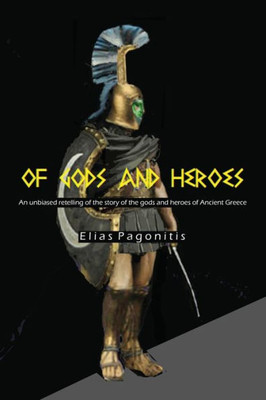
Sale
Of Gods And Heroes : An Unbiased Retelling Of The Story Of The Gods And Heroes Of Ancient Greece
Outskirts Press
ISBN13:
9781977213174
$23.95
$22.21
Set in the 4th Century, B.C.E., Of Gods and Heroes is based on historical characters and events. Structured on the Monomyth of Joseph Campbell from his work, The Hero with a Thousand Faces, and adheres to that plot sequence. Asopichos, the protagonist, is the first heroic fictional character in the tradition of Luke Skywalker from Star Wars and Neo from The Matrix to be gay. As his character develops, he takes us on us a whirlwind ride from his simple boyhood on shores of Lake Helike in central Boeotia, to his initiation as a warrior-lover in the Sacred Band of Thebes, then at the side of the great Theban general Epaminondas in his stunning victory over the Spartans at Leuctra. The story's denouement is his Awakening to the hypostasis, ultimate reality, on the slopes of Mount Parnassos after Epaminondas' death in the Battle of Mantinæa. Born in Denver, Colorado, Elias Pagonitis has an undergraduate degree in history from The Colorado College and a M.A. in Classical Studies from the University of Minnesota. 2010 was a very bad year for young gay suicides in the America. As I delved into the suffering that led to this, I also began this novel in a effort to alleviate such in the future. LGBT people should celebrate their heroic past to survive in the present, I thought. Homoerotic love, given in true friendship (by Eros in Philia Given), between two men was sacred to both the ancient Greeks and their gods. Hero-lovers like Epaminondas and Asopichos (the historical protagonists in this story) are our forebears, our inheritance, our history. We should take pride that homosexuality was a fundamental institution of ancient Greek culture and contributed to the birth of Western Civilization. In the face of this, there are historical revisionists who attempt to mispresent the ancient Greeks to fit their biases. One noted academic at Stanford University even went so far as to recast them as neurotic, latent-heterosexual, crypto-monotheists. The many the epithets of the all-pervasive gods (see Characters) are essential, if the reader were to get a sense of how the ancient Greeks saw and interacted with them. Similarly, to establish the close connection between the action in each chapter and the ethos of the ancients, each begins with a quote by either Parmenides, Hesiod, Pindar, Homer, Herodotos, Democritos, Archilochos, or the Oracle of Apollôn at Delphi (the first two of which were Boeotian). The educated ancient often quoted poets and, where I felt appropriate, my characters often do likewise. I make no claim to competency in ancient Greek and have relied primarily on online sources. Let me state here, that I have no interest in debating scholastics on the subject. This is a novel, not a doctoral thesis. Where possible, I changed the output to Æolic, the dialect of Greek spoken in Boeotia. Transliterations of words and phrases are set in italic and appear in the Glossary In writing of the distant past, linguistic inconsistencies are inevitable. Yet, the sound of it gives depth to such a dense work as this, as immersion, not necessarily readability, was my intent.
- | Author: Elias Pagonitis
- | Publisher: Outskirts Press
- | Publication Date: Aug 09, 2019
- | Number of Pages: 368 pages
- | Language: English
- | Binding: Paperback
- | ISBN-10: 1977213170
- | ISBN-13: 9781977213174
- Author:
- Elias Pagonitis
- Publisher:
- Outskirts Press
- Publication Date:
- Aug 09, 2019
- Number of pages:
- 368 pages
- Language:
- English
- Binding:
- Paperback
- ISBN-10:
- 1977213170
- ISBN-13:
- 9781977213174





